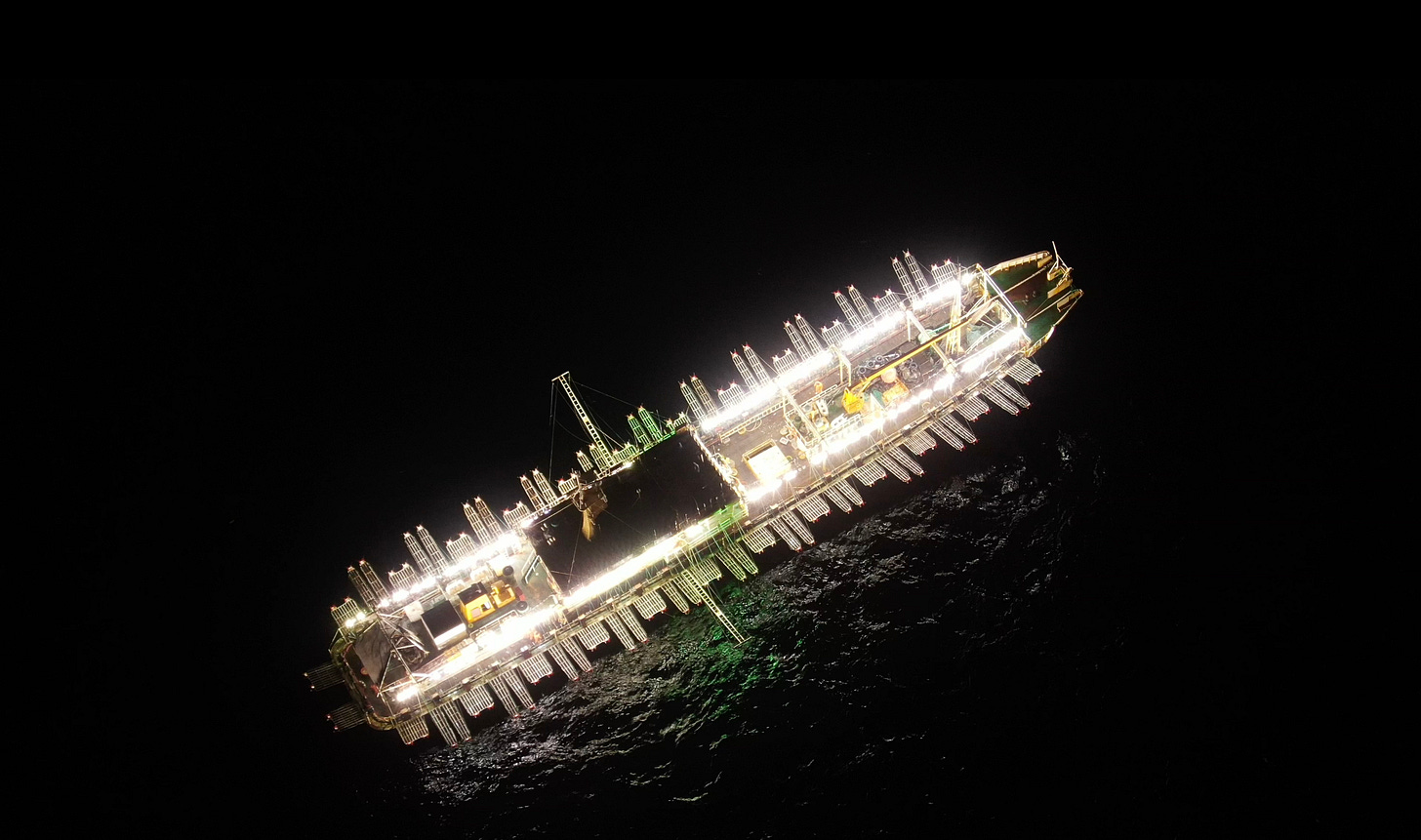
Bad things happened on the Zhen Fa 7. While this Chinese squid ship traversed the globe, the crew was beaten. They got horribly ill. They begged to leave the ship. The captain said no. Fishing illegally, he did not want to risk heading into port.
One crew member, Daniel Aritonang, was eventually dropped off in the middle of the night on the dock in Montevideo. His body was covered in bruises. His feet and hands were grotesquely swollen from an avoidable malnutrition disease called beriberi. He had marks around his neck where someone had tied a rope. He died shortly thereafter in a nearby hospital. Aritonang’s death was far from unusual. On average, one dead body was dropped off in the port of Montevideo every 6 weeks, most of them from Chinese squid ships like the Zhen Fa 7.
This week, the US Customs and Border Protection (CBP) agency announced that they wanted nothing to do with this ship.
“Effective immediately, CBP officers at all U.S. ports of entry will detain seafood, including but not limited to squid, harvested by Zhen Fa 7 based on reasonable suspicion that the vessel uses forced labor to harvest such seafood,” the CBP said in a press release. “As a result of these forced labor abuses, Zhen Fa 7 benefitted from lower labor costs, produced goods below market value, undercut American businesses, and unjustly earned profits.”
This “Withhold Release Order” or WRO was based on a 4-year investigation by the Outlaw Ocean about hidden crimes in China’s role as the superpower of seafood. The lead story in that investigation focussed on Aritonang. That investigation looked at crimes like human trafficking, murder, and illegal fishing on the high seas globally. It also looked into the use of state sponsored forced labor (specifically the use of Uyghurs and North Korean workers) in seafood factories in China on land.
Why is this an US economic issue? Because we found that squid from the Zhen Fa 7 as well as that processed in factories using illegal forced labor in processing plants on land in China, was being made into calamari, imported to the US, and then sold to American grocery stores and served at taxpayer-funded institutions like American military bases, public schools, federal prisons, even the cafeteria of Congress.
This week’s WRO from federal authorities was also the result of a year and a half of tireless work by the Human Trafficking Legal Center, which molded the Outlaw Ocean’s reporting into a formal petition to the government. Congratulations also goes to the New Yorker, the primary publishing partner for our investigation and kudos to the 241 other news outlets in 43 countries and 24 languages (Reach page) that further published the reporting, thereby sparking a global clamor.
In the past several months, Congressional, State Department and White House staff have contacted the Outlaw Ocean asking about the investigation into China. Most often they have sought updates on other areas where they might take action. Typically, we explain our approach and findings and then direct them to our Impact page which tracks what change the investigation has already spurred including actions like legislation passed, Congressional hearings, company ties to plants severed, op-Eds published, resignation of a seafood CEO, document requests from lawmakers, EU parliamentary debate, and company shareholder resolutions spurred. Still pending are two important petitions – one submitted to CBP calling for US import restrictions on the Wei Yu 18, another Chinese squid vessel using forced labor, and a second submitted to the Department of Treasury seeking formal sanctions against seven Chinese companies that were revealed as being tied to Uyghur forced labor.
Already done: the Dept. of Homeland Security last year blocked imports from a major Chinese seafood and added Chinese seafood categorically to the list of high priority enforcement targets tied to Uyghur forced labor. Lawmakers pressured Sysco and Costco, to get them to fix how they check for forced labor tied to Chinese seafood.
These are all worthy steps. We hope to see more.
It’s worth mentioning that our investigation into the Chinese fishing fleet is far from finished. In fact, next week we release Season 2 of the Outlaw Ocean Podcast (with the CBC), which will be an 8-part anthology that delves further into this and other topics.




